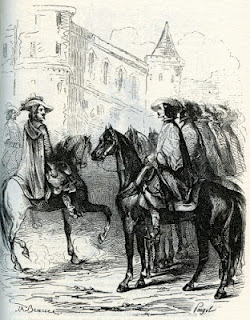 |
Siege of Stralsund – 1628
Public domain via Wikimedia Commons
|
In the immediately previous En Garde post,
your humble host started to provide
information about military campaigns. The outcome of any such
campaign is predicated by military ability – “the
numerical quantification of a character's ability to lead men in
battle.” Although not mentioned until page 19, military ability
is determined as a part of character generation. Unlike the other
ability scores, only one die is used to establish military
ability. It is also necessary
to determine military ability
for many non-player characters. For instance, when a player
character belongs to a regiment on campaign, military
ability must be established for
each commanding officer (and their adjutants) of every unit level
under which the player character serves. Page 21 tells us, “Campaign
battle results determination begins at the highest level and proceeds
to the lowest.” The roll of a die is compared to military
ability on the Battle Result
chart, first for the highest ranking officer and then down the chain
of command with a sort of 'trickle down' effect. In the example on
page 22, each of eight non-player characters is provided a military
ability so that the outcome of
a campaign can be found for a single player character. These
military ability
scores are recorded so that they will remain consistent when needed
for future campaigns. This would seem to be a great deal of
bookkeeping. Your humble host understands there are computer
programs that calculate and store these values but it is the
principle that is distressing.
In
any event, the personal outcome for a player character is eventually
resolved. The player makes a number of 2d rolls, trying to achieve a
certain number or greater in order to (a.) survive, (b.) be
'mentioned in dispatches,' (c.) be promoted, and (d.) acquire
plunder. (This method is the direct forebear of the process used for
each 'term of service' during Traveller character generation.)
Before making a roll for survival, a player can choose to apply a
positive modifier to the roll in order to have a greater chance of
survival. This is called poltroonery and, if discovered, can cause
the character to be disgraced. On the other hand, a player can opt
for reckless bravery; this increases the chance of death but also
increases the chances of being 'mentioned in dispatches,' being
promoted, and acquiring plunder. Being 'mentioned in dispatches'
entitles the character to one-to-six points of status for three
months and one point of status per month thereafter (cumulative with
other 'mentioned in dispatches' awards).
Being
promoted is conditional; there must be a vacancy (more bookkeeping)
and the character must be of sufficient social level. Of course,
with higher rank comes greater privilege in the form of status and
pay. Success in military endeavors can lead to a title of nobility
with an increase in social level, an award of status points, and a
possible pension. Higher ranks and titles are eligible for
appointments, such as Quartermaster General or Minister of State.
Some appointments can be quite lucrative, either by adopting policies
that enhance one's investments or by embezzlement. One interesting
appointment is the Commissioner of Public Safety. Not only can the
Commissioner “trump up charges against five players per year...he
must trump up charges against one player character” within the
first two seasons of his appointment.
Characters can use 'influence' to
affect rolls that represent the decision of a non-player character.
For instance, when attempting to secure an appointment, influence can
be expended to increase one's chances. Characters can also use
influence to the detriment of their enemies and rivals. Influence is
measured in units of favors and each favor is defined by its class.
Decision makers of greater prominence can only be influenced with
favors of higher class. As an example, a colonel can be influenced
with a class 3 favor, but the king can only be influenced with a
class 9 favor. Separate favors can be combined to increase their
effectiveness. Influence is obtained from one's mistress, from one's
position or appointment, and from one's own social level. There is
no allowance for it in the rules, but I think that characters should
be allowed to 'improve' the class of any given favor by contributing
a certain amount of funds, similar to how a courtship roll may be
modified – only more money would be required, such as 100 crowns
times the next higher class value. Perhaps there could be a way to 'convert' status to a favor.
In closing, your humble host perceives
En Garde as an interconnected set of ‘sub-games.’ First, there
is the ‘fencing’ game being, of course, the foundation upon which
the other games are situated. Next, we have the ‘social standing’
game characterized by the constant need to acquire status. Closely
aligned to the ‘social standing’ game is the ‘money management’ game with the risk-taking elements of gambling and investments. There is also the
‘military’ game, by which I refer to the resolution of campaigns
and their attendant effects upon characters. Also, there is the
'influence' game where influence is cultivated and strategically
spent. Finally, once the characters has progressed sufficiently, there is the 'appointment' game. Each 'sub-game' is indispensable but the rules for such need
not be ingrained. For example, players could employ a different
method to resolve duels without altering the rules for the other
'sub-games.' Also, I would like to think that military campaigns
could be handled in a more straightforward manner, yet not disrupt
other aspects of the game as a whole.
For those of you who may have missed
certain comments on prior posts, Les Petites Bêtes Soyeuses is an active game of En Garde! that currently seems to have
about fifty players. Please use the link for additional information.





